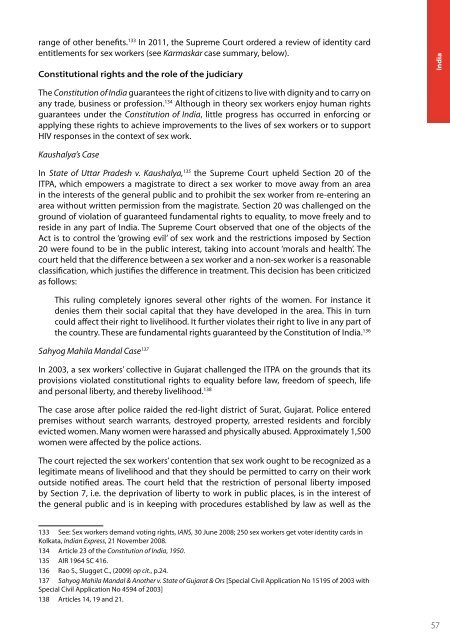SEX WORK AND THE LAW - HIV/AIDS Data Hub
SEX WORK AND THE LAW - HIV/AIDS Data Hub
SEX WORK AND THE LAW - HIV/AIDS Data Hub
You also want an ePaper? Increase the reach of your titles
YUMPU automatically turns print PDFs into web optimized ePapers that Google loves.
ange of other benefits. 133 In 2011, the Supreme Court ordered a review of identity card<br />
entitlements for sex workers (see Karmaskar case summary, below).<br />
Constitutional rights and the role of the judiciary<br />
India<br />
The Constitution of India guarantees the right of citizens to live with dignity and to carry on<br />
any trade, business or profession. 134 Although in theory sex workers enjoy human rights<br />
guarantees under the Constitution of India, little progress has occurred in enforcing or<br />
applying these rights to achieve improvements to the lives of sex workers or to support<br />
<strong>HIV</strong> responses in the context of sex work.<br />
Kaushalya’s Case<br />
In State of Uttar Pradesh v. Kaushalya, 135 the Supreme Court upheld Section 20 of the<br />
ITPA, which empowers a magistrate to direct a sex worker to move away from an area<br />
in the interests of the general public and to prohibit the sex worker from re-entering an<br />
area without written permission from the magistrate. Section 20 was challenged on the<br />
ground of violation of guaranteed fundamental rights to equality, to move freely and to<br />
reside in any part of India. The Supreme Court observed that one of the objects of the<br />
Act is to control the ‘growing evil’ of sex work and the restrictions imposed by Section<br />
20 were found to be in the public interest, taking into account ‘morals and health’. The<br />
court held that the difference between a sex worker and a non-sex worker is a reasonable<br />
classification, which justifies the difference in treatment. This decision has been criticized<br />
as follows:<br />
This ruling completely ignores several other rights of the women. For instance it<br />
denies them their social capital that they have developed in the area. This in turn<br />
could affect their right to livelihood. It further violates their right to live in any part of<br />
the country. These are fundamental rights guaranteed by the Constitution of India. 136<br />
Sahyog Mahila Mandal Case 137<br />
In 2003, a sex workers’ collective in Gujarat challenged the ITPA on the grounds that its<br />
provisions violated constitutional rights to equality before law, freedom of speech, life<br />
and personal liberty, and thereby livelihood. 138<br />
The case arose after police raided the red-light district of Surat, Gujarat. Police entered<br />
premises without search warrants, destroyed property, arrested residents and forcibly<br />
evicted women. Many women were harassed and physically abused. Approximately 1,500<br />
women were affected by the police actions.<br />
The court rejected the sex workers’ contention that sex work ought to be recognized as a<br />
legitimate means of livelihood and that they should be permitted to carry on their work<br />
outside notified areas. The court held that the restriction of personal liberty imposed<br />
by Section 7, i.e. the deprivation of liberty to work in public places, is in the interest of<br />
the general public and is in keeping with procedures established by law as well as the<br />
133 See: Sex workers demand voting rights, IANS, 30 June 2008; 250 sex workers get voter identity cards in<br />
Kolkata, Indian Express, 21 November 2008.<br />
134 Article 23 of the Constitution of India, 1950.<br />
135 AIR 1964 SC 416.<br />
136 Rao S., Slugget C., (2009) op cit., p.24.<br />
137 Sahyog Mahila Mandal & Another v. State of Gujarat & Ors [Special Civil Application No 15195 of 2003 with<br />
Special Civil Application No 4594 of 2003]<br />
138 Articles 14, 19 and 21.<br />
57
















